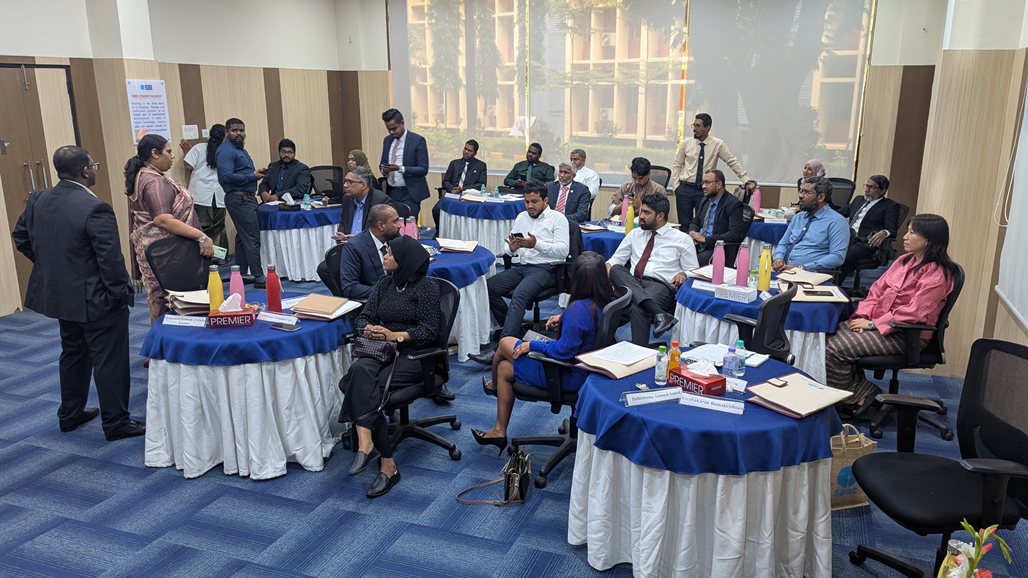The Asian Bankers Association (ABA) and the State Bank of India (SBI) jointly organized from 17–20 August 2025, the Short-Term Visiting Program titled “Asian Bankers Summit 2025” at the SBI Staff College in Hyderabad. The venue is a 16-acre campus located in the heart of the city, featuring its own hotel facilities, restaurants, auditoriums, classrooms, sports facilities, and dormitories for staff and faculty.
Gathering 23 delegates from the Maldives, Sri Lanka, Bhutan, and Taiwan, the three-day intensive program was comprised of professional learning, cultural activities, and networking, providing delegates the opportunity to gain insights into modern banking techniques, skills, and procedures practiced by SBI, while engaging closely with faculty members who each had more than 20–30 years of experience in their fields.
ARRIVAL - Sunday, 17 August 2025
The delegates arrived in Hyderabad on Sunday, 17 August 2025, where they were warmly welcomed by the SBI Staff College team led by Mr. M. Joseph Christy, DGM & Senior Faculty, and Ms. Kiranmayi Nittala, Chief Manager & Faculty. In the evening starting at 7:30 PM, the group enjoyed a Gala Dinner, which provided an opportunity for them to get acquainted and experience SBI’s hospitality.
FIRST DAY – Monday, 18 August 2025
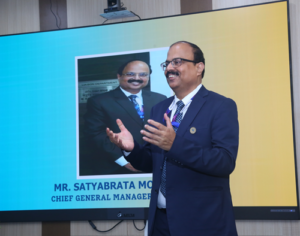 The day began at 9:00 AM with Welcome Remarks by Shri Satyabrata Mohapatra, CGM & Director, and Shri Rajiv Seraphim, DGM, Research & Administration. The first day featured five courses:
The day began at 9:00 AM with Welcome Remarks by Shri Satyabrata Mohapatra, CGM & Director, and Shri Rajiv Seraphim, DGM, Research & Administration. The first day featured five courses:
(1) Navigating Global Markets – Unlocking Global Opportunities by Sunil Kumar and Debashish Joshi
In the Treasury domain, SBI stands as one of the largest banks in the region and ranks among the top 50 globally. It acts as a market maker, facing four major mid-to-long-term trends: (1) globalization, (2) USD revaluation and policy changes, (3) technological and political shifts, and (4) regional growth.
Yet, short-term challenges persist, as markets remain volatile due to U.S.–China tensions, the disruptive impact of AI and digital finance, and shifting supply chains.
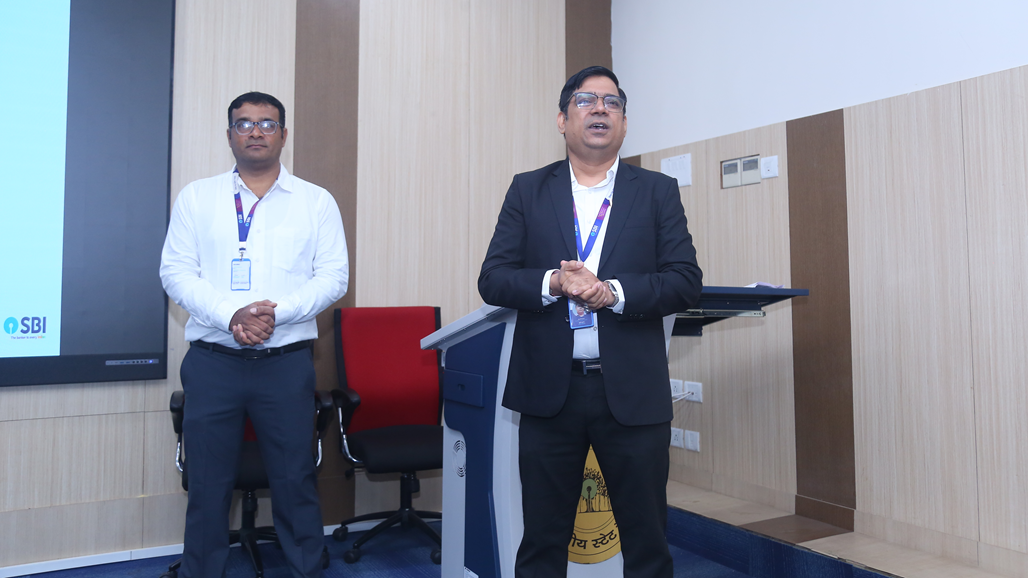
India itself has received $81 billion in FDI and generates about $210 billion annually through IT services, although its manufacturing sector contributes only 25% to GDP.
The key takeaways were summarized as: (1) Accessibility through strategy, (2) Prioritization of regional growth corridors, (3) Leveraging digital inclusion, and (4) Exploring capital market collaborations. Delegates appreciated the structured outlook, which blended both opportunities and caution for banks engaging internationally.
(2) The Power of Social Data – Social Media Analytics for Impact by Deepa Balakrishnan and Abhinav Agarwal
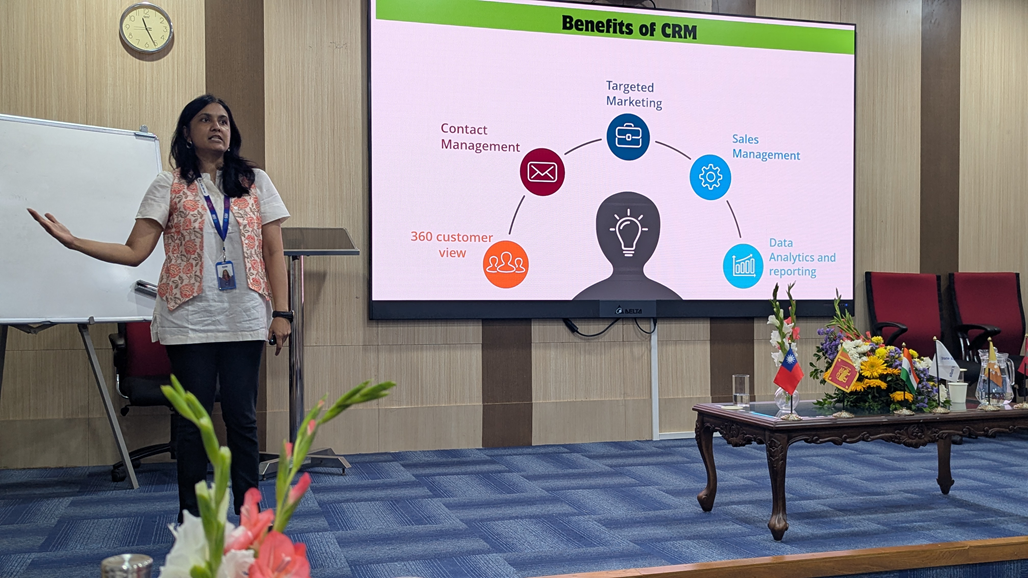
The session highlighted SBI’s analysis of major social media platforms, where X (formerly Twitter), YouTube, and Facebook dominate in audience reach and marketing effectiveness, followed by Instagram, LinkedIn, and Pinterest. X was identified as especially impactful for product promotion and customer service.
However, the value of social media lies not only in audience size but in engagement quality, which directly drives revenue potential.
A key focus was on integrating social media data with CRM (Customer Relationship Management) systems, enabling measurement of customer lifetime value and overall customer experience. Benefits of CRM include: (1) a clear 360-degree customer view, (2) effective contact management, (3) targeted marketing, and (4) improved sales performance. The session emphasized that social data, when systematically analyzed, becomes a powerful strategic asset for modern banks.
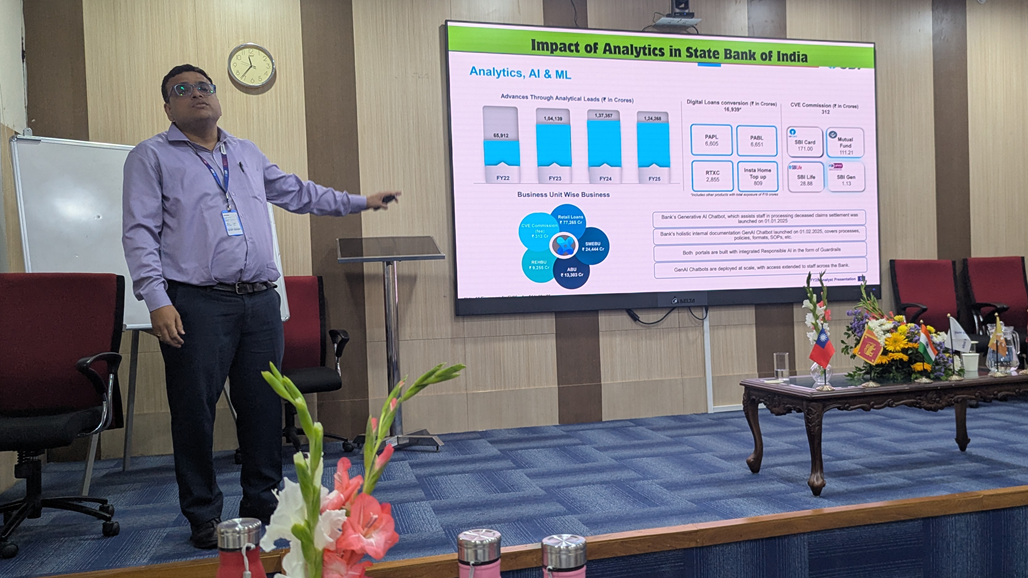
(3) Financial Inclusion in a Connected World – Banking with a Purpose by L. Srinivasu and K. Prasad
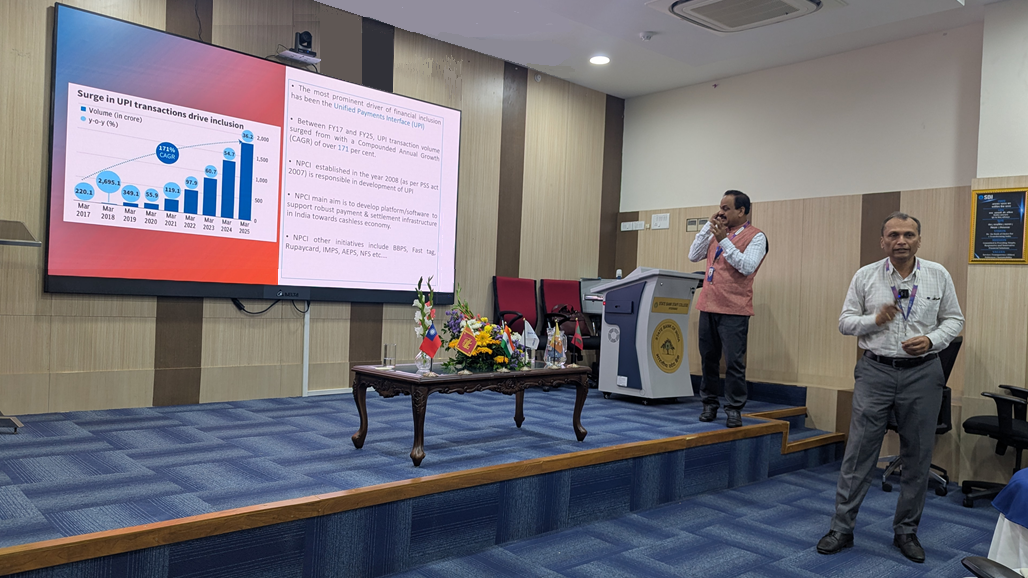
The introduction of UPI (Unified Payments Interface) in 2016, initiated by the Reserve Bank of India, has been a transformative success. Developed by the National Payments Corporation of India (NPCI), UPI is a mobile-based real-time payments system that has fueled a massive surge in both commercial and personal transactions, driving financial inclusion nationwide. Transaction volumes have grown at an extraordinary CAGR of 171%.
SBI’s UPI system ensures seamless, secure, and real-time transactions, free of charge below a certain limit. The professor also highlighted how UPI has been replicated abroad to promote inclusive financial ecosystems. The session underscored India’s role as a global leader in payment innovation.
(4) Energizing Leadership – Empowering High-Impact Teams by M. Joseph Christy and Kiranmayi Nittala

Using a gamified teaching method, the session explored how diverse individuals can form cohesive and high-performing teams.
Delegates learned five pillars of leadership: (1) authority, (2) relationship-building, (3) production and results, (4) delegation and responsibility, and (5) reaching the pinnacle of self-directed performance.
The interactive approach demonstrated that leadership development is both a science and an art, requiring adaptability, empathy, and accountability.
(5) Global Insights for Financial Resilience by Deepak Kumar Choudhary
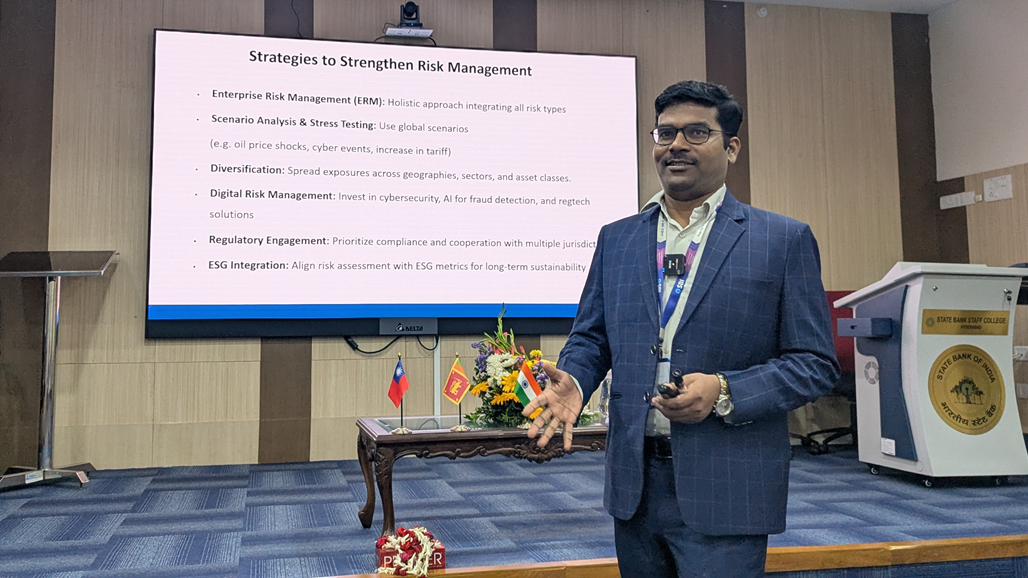
The session revisited lessons from recent financial crises, such as the collapse of Credit Suisse, to illustrate how modern risk management must move beyond static assessments toward dynamic forecasting. Five major risks were emphasized: (1) market volatility, (2) cyber threats, (3) climate change, (4) regulatory complexity, and (5) supply chain disruptions.
Asian banks, however, were noted for their resilience, thanks to prudent credit expansion, reliance on deposit funding, stronger asset quality, and healthier current accounts.
The session concluded with six strategies for strengthening resilience: (1) ERM frameworks, (2) scenario analysis and stress testing, (3) asset/geographic diversification, (4) digital risk management, (5) proactive regulatory engagement, and (6) ESG integration. Delegates valued the practical focus on building robust, future-ready institutions.
The Cultural Evening
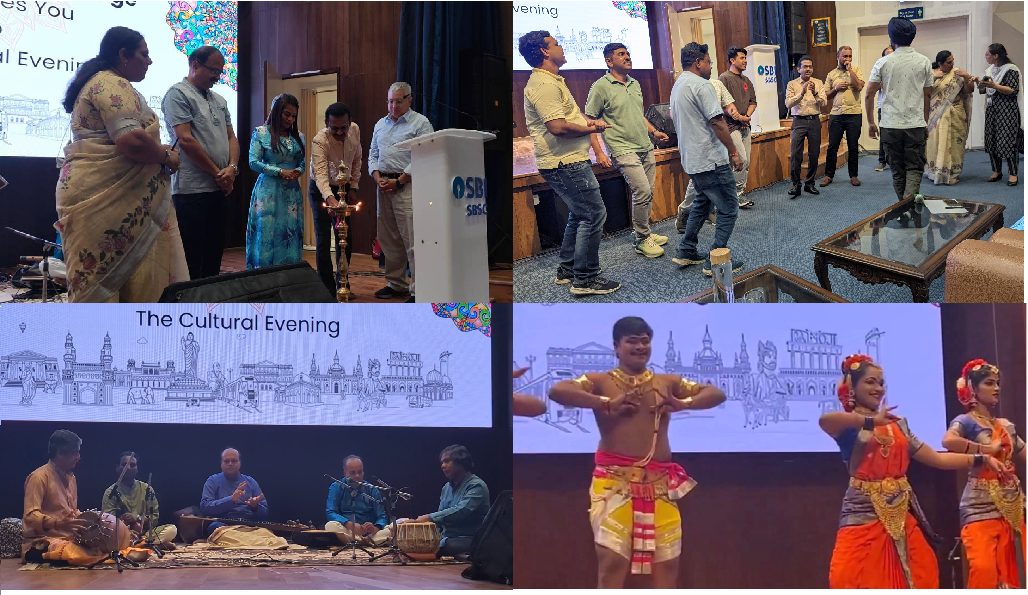
That evening, delegates attended a Cultural Evening at the SBI Auditorium located in another area of their large compound. The program began with a candle-lighting ceremony, followed by a 35-minute performance of traditional Indian folk music. Then, a group of folk dancers further energized the night with their particular rhythms and pirouettes. The lively atmosphere culminated in delegates dancing to the rhythm of the local music, adding to the spirit of cultural exchange.
SECOND DAY – Tuesday, 19 August 2025
The second day featured three courses:
(6) Global Governance – Challenges in Financial Transparency by Anurag Tiwari
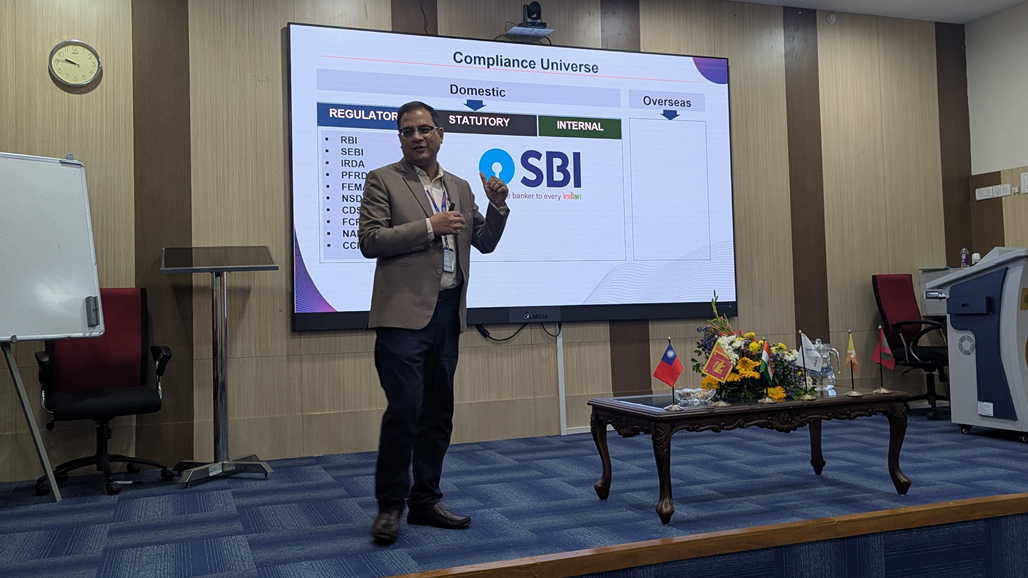
This session examined compliance complexities across multiple layers: (1) regulations, (2) status, and (3) internal policies. For SBI, compliance spans the SBI Act, Banking Regulation Act, Income Tax Act, IT Act, state laws, and statutory rules, as well as global regulations.
A strong compliance culture rests on accurate KYC processes, which have greatly improved in India. Acceptable ID documentation includes passports, driving licenses, voter IDs, Aadhaar cards, and job cards under NREGA. The discussion highlighted how proper compliance not only ensures legal adherence but also protects institutional integrity and customer trust.
(7) Financial Growth in Agricultural Ecosystems by Dheeraj Kumar \and Anupama Kar
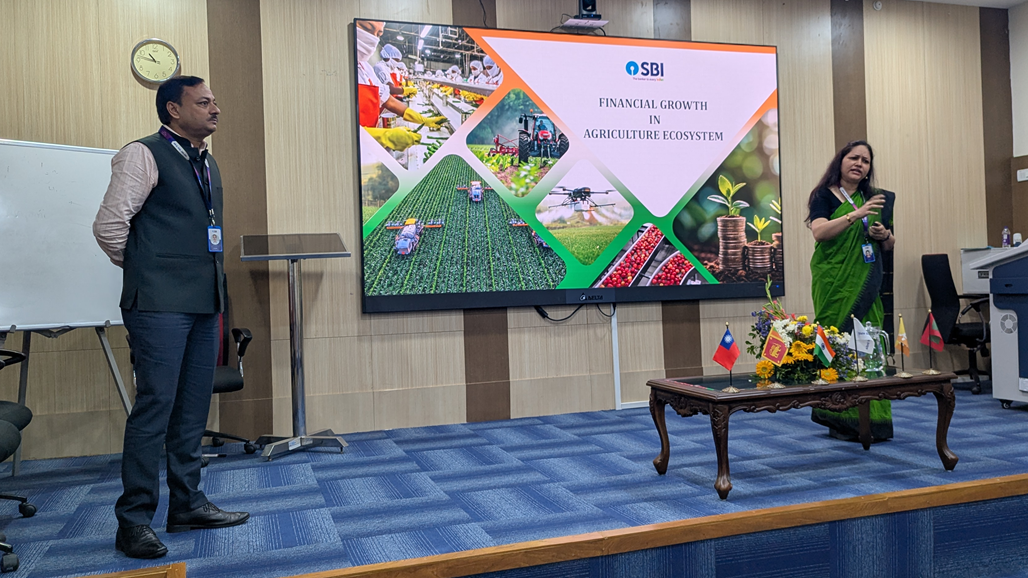
India’s agricultural sector has seen remarkable improvements in both productivity and crop quality in recent years, with SBI playing a pivotal role. Through its 15,000+ rural branches, SBI supports farmers, supply chains, irrigation projects, and organic farming initiatives.
The bank’s approach extends beyond financing farmers to fostering entire agribusiness ecosystems. Agriculture contributes about 16–20% of India’s GDP, with SBI helping transform India into a leading exporter of agri-products.
One example shared was a small fruit farmer who collaborated with Taiwanese counterparts to introduce pink guava to India, eventually expanding to 2,500 hectares.
Today, India ranks first globally in the production of milk, pulses, millets, spices, and sugar, and second in food grains, fruits, fish, and tea. The integration of new technologies, such as hydroponics and precision farming, continues to modernize the sector. Delegates came away impressed by how financial inclusion can drive agricultural innovation and rural prosperity.
(8) Global Strategies for SME Lending Success by S. V. Vishnu
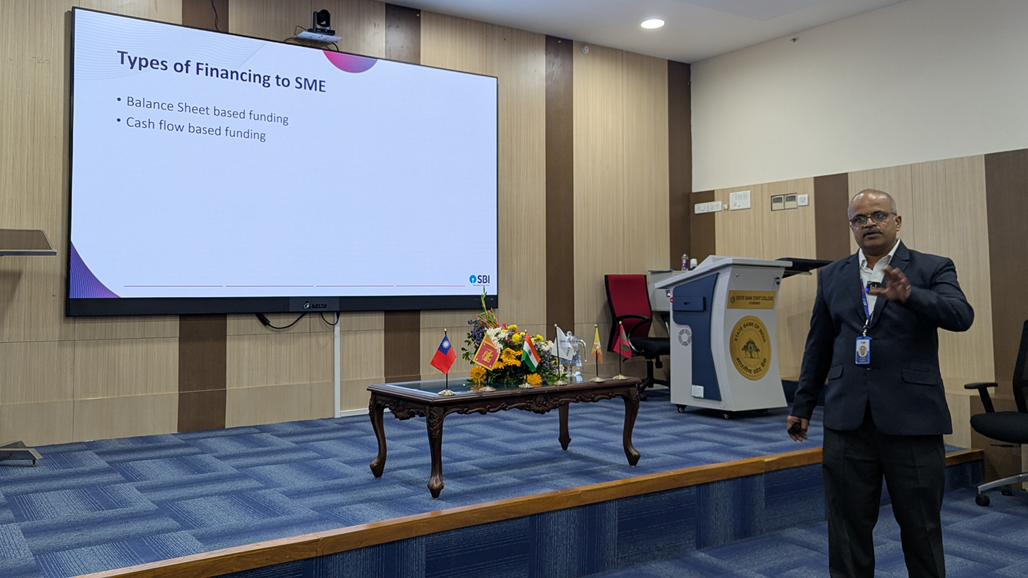
Compared to larger economies such as the U.S., China, and Germany, India’s SME sector remains relatively underdeveloped, yet it holds vast potential. SBI has pioneered balance-sheet and cash-flow–based funding models, while UPI adoption has strengthened SME accounting and cash-flow management.
Opportunities are emerging in ESG-linked financing, startup support, account aggregation, and e-invoice funding. Technology has been a game-changer: fintech and automated risk-rating tools have enhanced borrower identification, credit access, and risk management.
The session emphasized that empowering SMEs is key to inclusive growth, and SBI’s initiatives are laying the groundwork for a more vibrant entrepreneurial ecosystem in India.
The Business and Tourism Visits

Following the lectures, delegates toured SBI’s largest branch in Hyderabad, a historic building over 100 years old. They also visited the 18th-century Chowmahalla Palace, a striking blend of architectural styles with grand courtyards, gardens, and the famous Khilwat Darbar Hall. The day concluded with a Farewell Dinner at the SBI Staff College Hotel.
DEPARTURE – Wednesday, 20 August 2025
Delegates departed Hyderabad on 20 August with a deep sense of satisfaction from the program. They praised the quality of presentations, the hospitality, and the spirit of camaraderie.
As Mr. Kirubakaran Ramakrishnan, Head of Credit at Amana Bank Plc. (Sri Lanka), remarked:
“The knowledge shared by the trainers and facilitators was immense, giving us a clear view of the structure and processes. Overall, it was a very interesting and useful program.”
DELEGATION
Credit Information Bureau of Bhutan Ltd.:
Karma Choden
Leewang Raj Gurung
Maldives Finance and Leasing Company Pvt. Ltd.:
Ibthishama Ahmed Saeed
Fathimath Mohamed Faiz
Yamyn Adam
Maldives Islamic Bank Plc.:
Adam Afrah
Ismail Abdul Majeed Ibrahim
Hussain Firaash
Ali Mohamed
Mariyam Lubna
Aminath Ziyadha
Farish Abdul Sattar
Ahmed Mohamed
Ismail Shafeeu
Abdulla Umar
Mohamed Ahsan Abdulla
Mohamed Shareef
Mohamed Samooh Abdulla Khaleel
Amana Bank Plc. (Sri Lanka):
Kirubakaran Ramakrishnan
Pan Asia Banking Corporation Plc. (Sri Lanka):
Rajith Thoradeniya
Janashakthi Finance Plc. (Sri Lanka):
Amila Sahan Edirisinghe
Isuru Viraj Kumarage
Asian Bankers Association (Taiwan):
Mig Moreno

